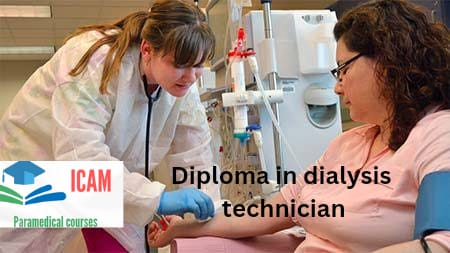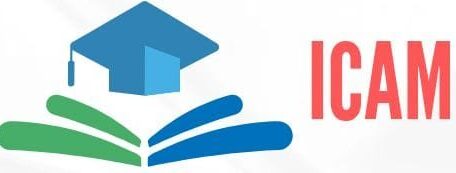Diploma in Dialysis Technician: Empowering Healthcare Heroes
Introduction: Welcome to the world of Dialysis Technicians! The Diploma in Dialysis Technician program offered by the Indian Council of Alternative Medicine (ICAM) is designed to equip aspiring healthcare professionals with the knowledge and skills required to become proficient Dialysis Technicians. Our comprehensive curriculum and hands-on training will prepare you to excel in the field of dialysis and make a positive impact on patients’ lives.

Course Content:
- Introduction to Dialysis:
- Overview of dialysis and its significance in healthcare
- Understanding the renal system and its functions
- Common kidney disorders requiring dialysis
- Anatomy and Physiology:
- Study of the human body systems relevant to dialysis
- In-depth understanding of the renal system
- Knowledge of the circulatory system and blood composition
- Dialysis Techniques:
- Comprehensive overview of hemodialysis and peritoneal dialysis
- Dialysis equipment and their functions
- Hands-on training on operating dialysis machines
- Patient Care and Communication:
- Developing compassionate patient care skills
- Effective communication and counseling techniques
- Addressing patients’ emotional needs during dialysis sessions
- Infection Control and Safety Measures:
- Implementing standard precautions and infection control protocols
- Maintaining a safe environment during dialysis procedures
- Preventing cross-contamination and infection transmission
- Dialysis Complications and Management:
- Identifying and managing common complications during dialysis
- Handling vascular access-related issues
- Monitoring and maintaining fluid balance
- Medical Emergencies in Dialysis:
- Recognizing and responding to dialysis-related emergencies
- Basic life support techniques
- Emergency preparedness and crisis management
- Professional Ethics and Legal Aspects:
- Ethics and code of conduct for dialysis technicians
- Legal implications and responsibilities in dialysis care
- Respecting patient rights and maintaining confidentiality
- Practical Training:
- Hands-on experience in a clinical setting
- Simulated dialysis sessions with real patients
- Supervised practice of dialysis techniques and procedures
- Specialization and Advancements:
- Exploring specialized areas within dialysis care
- Introduction to advanced dialysis technology and procedures
- Keeping up-to-date with emerging trends and developments
Syllabus:
The syllabus for the Diploma in Dialysis Technician program offered by the Indian Council of Alternative Medicine (ICAM) typically includes the following subjects and topics:
- Anatomy and Physiology:
- Introduction to human anatomy and physiology
- Structure and functions of the renal system
- Circulatory system and blood composition
- Introduction to Dialysis:
- Overview of dialysis and its significance in healthcare
- Common kidney disorders requiring dialysis
- Principles and goals of dialysis treatment
- Dialysis Techniques:
- Hemodialysis: Principles, equipment, and procedures
- Peritoneal dialysis: Principles, equipment, and procedures
- Dialysis prescription and treatment planning
- Dialysis Equipment and Maintenance:
- Understanding dialysis machines and their components
- Proper setup and calibration of dialysis equipment
- Maintenance and troubleshooting of dialysis machines
- Patient Assessment and Care:
- Patient assessment prior to dialysis treatment
- Preparing the patient for dialysis and obtaining informed consent
- Monitoring and documenting vital signs during dialysis
- Infection Control and Safety Measures:
- Standard precautions and infection control protocols
- Sterilization techniques and aseptic practices
- Safety measures during dialysis procedures
- Dialysis Complications and Management:
- Common complications during dialysis and their management
- Recognizing signs of dialysis access malfunction
- Handling adverse reactions and emergencies during dialysis
- Water Treatment in Dialysis:
- Importance of water quality in dialysis treatment
- Water treatment systems and their maintenance
- Monitoring water quality and ensuring safety standards
- Professional Ethics and Communication:
- Ethical principles and professional conduct in dialysis care
- Effective communication with patients, healthcare professionals, and families
- Respect for patient rights and confidentiality
- Practical Training and Clinical Experience:
- Hands-on training in a clinical setting
- Performing dialysis procedures under supervision
- Practicing infection control and safety protocols
Top Recruiting Areas: Upon completion of the Diploma in Dialysis Technician program, graduates can explore promising career opportunities in:
- Hospitals and Medical Centers
- Dialysis Centers and Renal Care Facilities
- Nephrology Departments in Healthcare Institutions
- Home Dialysis Service Providers
- Research Organizations in the Medical Field
Job Positions: Graduates of the program can apply for various job positions, including:
- Dialysis Technician
- Dialysis Assistant
- Renal Care Technician
- Dialysis Unit Coordinator
- Nephrology Nurse Assistant
Specialization: In addition to the foundational knowledge gained in the program, individuals can pursue specialization in areas such as:
- Pediatric Dialysis
- Geriatric Dialysis
- Dialysis Equipment Maintenance
- Peritoneal Dialysis
